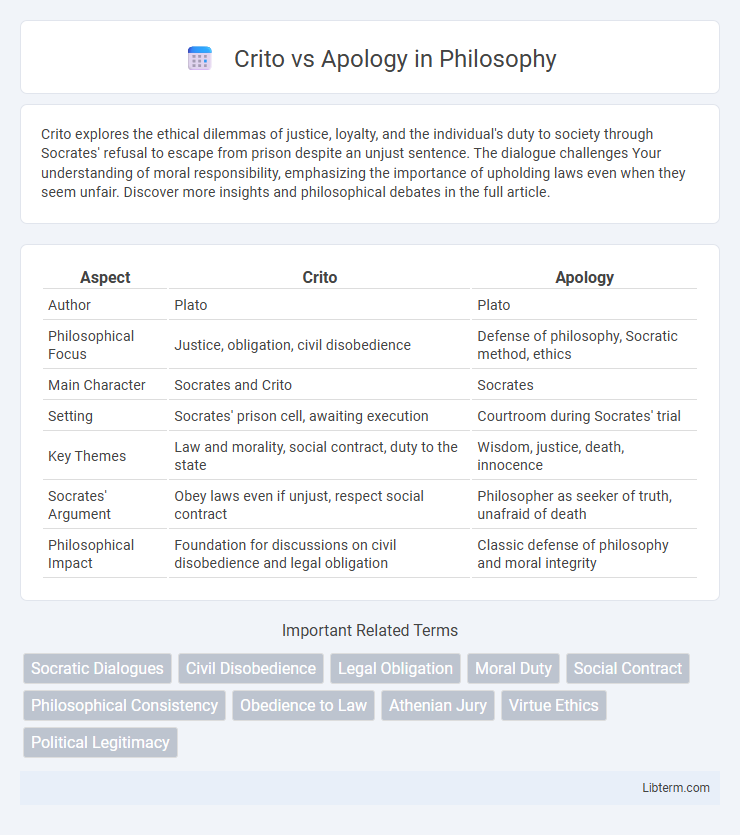Crito explores the ethical dilemmas of justice, loyalty, and the individual's duty to society through Socrates' refusal to escape from prison despite an unjust sentence. The dialogue challenges Your understanding of moral responsibility, emphasizing the importance of upholding laws even when they seem unfair. Discover more insights and philosophical debates in the full article.
Table of Comparison
| Aspect | Crito | Apology |
|---|---|---|
| Author | Plato | Plato |
| Philosophical Focus | Justice, obligation, civil disobedience | Defense of philosophy, Socratic method, ethics |
| Main Character | Socrates and Crito | Socrates |
| Setting | Socrates' prison cell, awaiting execution | Courtroom during Socrates' trial |
| Key Themes | Law and morality, social contract, duty to the state | Wisdom, justice, death, innocence |
| Socrates' Argument | Obey laws even if unjust, respect social contract | Philosopher as seeker of truth, unafraid of death |
| Philosophical Impact | Foundation for discussions on civil disobedience and legal obligation | Classic defense of philosophy and moral integrity |
Introduction to Crito and Apology
Plato's "Crito" explores Socrates' ethical stance on justice and obedience to law, presenting a dialogue where Socrates refuses Crito's proposal to escape prison, emphasizing the importance of social contracts. In contrast, the "Apology" serves as Socrates' defense speech during his trial, articulating his philosophical mission and challenging the accusations of corrupting the youth and impiety. Both texts introduce foundational ideas regarding law, morality, and Socratic philosophy, highlighting different contexts of Socrates' life and thought.
Historical Context of Plato’s Dialogues
Plato's dialogues Crito and Apology are set in the turbulent political climate of Athens following the Peloponnesian War, reflecting the challenges faced by Socrates during his trial and imprisonment. The Apology captures Socrates' defense against charges of corrupting the youth and impiety, illustrating the strained relationship between philosophical inquiry and Athenian democracy. The Crito explores themes of justice and civic duty as Socrates refuses to escape prison, emphasizing the social contract and the authority of the state in classical Athens.
Central Themes in Crito
Crito explores themes of justice, obligation, and the social contract through Socrates' refusal to escape prison despite an opportunity to avoid execution. The dialogue emphasizes the importance of respecting laws and the ethical duty to uphold society's legal framework, even when facing personal injustice. Socrates argues that breaking laws harms the city and oneself, highlighting moral integrity over self-preservation.
Central Themes in Apology
Apology centers on Socrates' defense against charges of corrupting youth and impiety, emphasizing the pursuit of truth and the examined life as essential virtues. It highlights the tension between individual conscience and societal norms, portraying Socrates' commitment to divine mission despite the risk of death. The text explores themes of wisdom, moral integrity, and the value of philosophical inquiry over popularity or power.
Socrates’ Philosophy of Justice
Socrates' philosophy of justice in *Crito* emphasizes the inviolability of laws and the moral duty to obey the social contract, asserting that escaping prison would undermine the justice he upholds. In *Apology*, Socrates defends his commitment to justice by prioritizing the pursuit of truth and virtue over popular opinion or legal threats, arguing that an unjust life is worse than death. Together, these works illustrate Socrates' consistent belief that justice transcends personal consequence and requires unwavering adherence to ethical principles.
The Role of Law in Both Dialogues
In "Crito," Socrates emphasizes the importance of obeying the laws of Athens, arguing that breaking them undermines the social order and justice itself. Conversely, in "Apology," Socrates defends his actions by asserting that his pursuit of truth and moral duty transcends conventional legal constraints when those laws conflict with higher ethical principles. Both dialogues explore the tension between individual conscience and state law, highlighting the philosopher's commitment to justice over mere legal compliance.
The Concept of Civic Duty
In Plato's *Crito*, Socrates emphasizes the concept of civic duty by asserting that individuals must obey the laws of the state even when facing personal injustice, highlighting respect for the social contract as a cornerstone of civic responsibility. Conversely, in *Apology*, Socrates prioritizes moral obligation over legal obedience, arguing that one must never commit an injustice even in response to wrongful accusations, thus framing civic duty as adherence to ethical principles above codified laws. Together, these dialogues delineate the tension between legal compliance and moral integrity within the framework of ancient Athenian society.
Contrasts in Socrates’ Attitude Toward Death
In *Crito*, Socrates exhibits calm acceptance of death, emphasizing the importance of obeying the state's laws and upholding justice even at the cost of his life. In contrast, *Apology* reveals Socrates' fearless defiance toward death, as he views it either as a peaceful nothingness or a transition to an improved existence through philosophical inquiry. These contrasting attitudes highlight Socrates' unwavering commitment to his principles, showing both rational acceptance and bold challenge in the face of mortality.
Moral Responsibility and Personal Integrity
Crito and Apology explore Socratic themes of moral responsibility and personal integrity through distinct contexts; in Apology, Socrates defends his commitment to truth and justice, asserting that adherence to moral principles outweighs fear of death. In Crito, Socrates refuses to escape prison, arguing that violating the laws would compromise his integrity and social duty, emphasizing that ethical responsibility to the state transcends personal preservation. Both dialogues underscore Socrates' unwavering dedication to living an examined life anchored in virtue over expediency.
Lasting Impact and Modern Relevance
Crito and Apology offer profound insights into justice and moral duty, cementing their lasting impact on Western philosophy and legal thought. Apology highlights Socrates' commitment to truth and individual conscience, shaping modern ideals of free speech and civic responsibility. Crito explores the tension between personal obligation and societal laws, influencing contemporary debates on civil disobedience and ethical governance.
Crito Infographic

 libterm.com
libterm.com